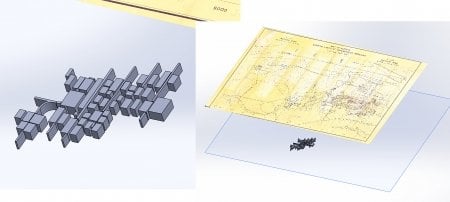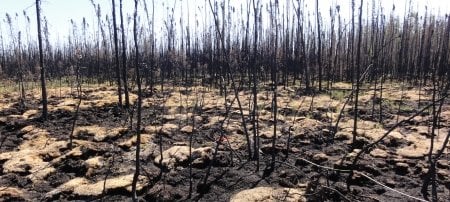Idle Farmlands Could Become Profitable Carbon Storage Banks
Michigan's recently enacted renewable energy portfolio legislation sets new requirements for green energy production in the State. Michigan policymakers believe energy plantations could be a major source of biomass fuels. But could northern Michigan farmers earn a profit converting idle farmland to tree plantations as biomass energy crops?
Answering this question was the goal of Michigan Technological University graduate student Chris Miller's Master's degree thesis research. Miller and his advisor, Robert Froese, a professor in Michigan Tech's School of Forest Resources and Environmental Science, examined whether aspen trees planted on idle farmland in Presque Isle County could be sold profitably as chips used as biomass for electric power generation.
"The Michigan Climate Action Council draft policy options note that biomass from energy crops is an important part of the renewable energy solution," Froese said. "But more importantly, putting idle lands back into production is a way to bring economic opportunities to northern Michigan communities."
Miller developed detailed cultivation and cost models for planting, tending and harvesting aspen trees and adapted existing models that predict forest growth to estimate the amount of chips that could be produced on lands of different quality. Though the current market price for coal and wood chips is low, Miller found that farmers should be able to turn a profit on the very best lands in the northern lower part of the State.
But the price of chips is just one of the potential revenues from biomass crop production, Miller said. Tree plantings not only produce biomass that can be harvested for fuel, but root growth and years of fallen leaves incorporated in the soil also store carbon from the atmosphere that was released from fossil fuels burned elsewhere.
"Michigan's Conservation and Climate Initiative allows farmers to plant trees and get credit for the carbon dioxide sequestered in plantation soils," Miller noted. "These credits can be sold on the Chicago Climate Exchange and will become more and more valuable in the future."
When Miller took carbon credits into consideration in his cost models, an entirely different picture emerged. He found that a net credit of only $6 per metric ton would make aspen plantations economically feasible on all of the lands studied in Presque Isle County, including lands of relatively low quality.
"Our research shows that we're surprisingly close to the tipping point where tree plantations on large areas of idle farmlands would be profitable," said Froese. "If chip prices increase because of increased demand for wood fiber from a number of bioenergy projects being developed in Michigan, this alone could be sufficient."
Michigan Technological University is a leading public research university, conducting research, developing new technologies and preparing students to create the future for a prosperous and sustainable world. Michigan Tech offers more than 120 undergraduate and graduate degree programs in engineering, forestry and environmental sciences, computing, technology, business and economics, natural and physical sciences, arts, humanities and social sciences.
Michigan Technological University is an R1 public research university founded in 1885 in Houghton, and is home to nearly 7,500 students from more than 60 countries around the world. Consistently ranked among the best universities in the country for return on investment, Michigan's flagship technological university offers more than 185 undergraduate and graduate degree programs in science and technology, engineering, computing, forestry, business, health professions, humanities, mathematics, social sciences, and the arts. The rural campus is situated just miles from Lake Superior in Michigan's Upper Peninsula, offering year-round opportunities for outdoor adventure.




Comments